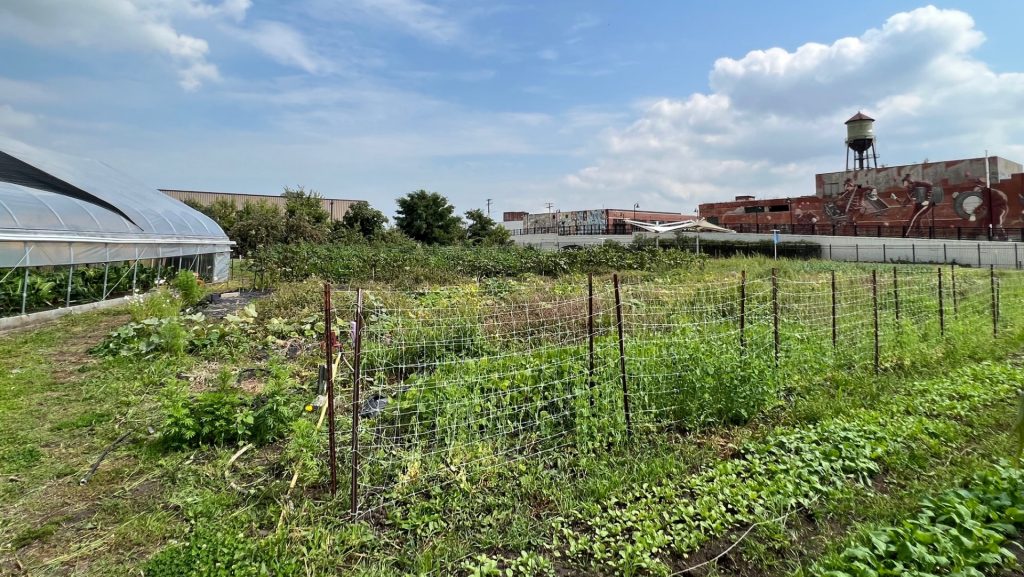Detroit Evening Report: Applications open for Detroit Black Farmer Land Fund; expanded health resources for farmworkers + more
Sascha Raiyn June 25, 2024Listen to the latest episode of the “Detroit Evening Report” podcast.

Keep Growing Detroit's urban farm near Eastern Market.
Today on the Detroit Evening Report, we cover the Detroit Black Farmer Land Fund and its available funds for local growers; new multilingual health resources for seasonal farmworkers in the state and more.
Subscribe to the Detroit Evening Report on Apple Podcasts, Spotify, NPR.org or wherever you get your podcasts.
Detroit Black Farmer Land Fund applications open
The Detroit Black Farmer Land Fund is fundraising $150,000 to support 50 Black growers in Detroit, Highland Park and Hamtramck, with applications due by July 29.
Supported by three of Detroit’s longstanding urban farming organizations — The Detroit Black Community Food Sovereignty Network, Keep Growing Detroit and the Oakland Avenue Urban Farm — the goal of the fund is to “rebuild inter-generational land ownership for Black farmers in Detroit,” according to DBFLF’s website.
Funds can be used for land purchases, as well as infrastructure projects and/or equipment needs for land they are currently farming or plan to farm on. Awardees will also have access to up to $500 for skill building/professional development, in addition to their award.
This is the fifth year of the Detroit Black Farmer Land Fund. For more information visit detroitblackfarmer.com.
MDHHS expands resources for farmworkers
The Michigan Department of Health and Human Services is now providing information about influenza A in three languages to prevent the spread of illness among the state’s seasonal farmworkers.
The agency provides resources and information about the illness through a toll-free hotline, which can now service people who speak English, Spanish and Haitian-Creole. The state says two-thirds of Michigan’s seasonal farmworkers speak only Spanish.
Translations of press releases and other safety and health materials are available on the hotline. MDHHS says it can also provide translation when farmworkers who speak other languages call the department.
The Farmworker Hotline number is 833-742-9832. Michigan has reported two human cases of influenza A in dairy farmworkers.
Neighborhood Solar project launches
Detroit Mayor Mike Duggan announced the first three neighborhoods selected to replace vacant land with solar arrays that will generate enough energy to power all municipal buildings in the city.
The homeowners near the new solar project will also receive $15,000-$25,000 to make energy efficient upgrades to their homes.
Those living on the land where the arrays will be built will need to move. The city is offering $20,000 and relocation assistance for each home located where the panels will be built.
Duggan made the announcement at a press conference on Monday in Detroit’s Gratiot/Findlay neighborhood — one of the three neighborhoods selected, along with the Van Dyke/Lynch and State Fair neighborhoods.
He says he wants to make sure the residents affected by the project know they’re not overlooked.
“We are going to make the neighborhoods around this area bloom. For those of you who stayed and thought the blight here was going to spread. You now know your neighborhood has a bright future,” he said.
Duggan says renters in the area will receive 18 months free rent and assistance to move as well.
Public invited to Community Visioning Session
The Downtown Detroit Partnership is inviting the public to a Community Visioning Session at 6 p.m. Thursday at the Mike Illitch School of Business, 2772 Woodward Ave., Detroit.
The goal of the session is to generate ideas about how to use and design the area between 3rd Avenue and Brush Street – communities that were decimated by freeways built decades ago. The city of Detroit and the Michigan Department of Transportation are also partners in the event.
A helping hand for the homeless
The head of a local homeless shelter says sweltering heat can be just as deadly as bitter cold to those who have no place to go.
Brian Wright, executive director of Hope Shelters in Pontiac, says the staff works with Oakland University’s street medicine team to find homeless people and encourage them to come to the shelter.
“We offer them rides to a hospital if they need it, or doctor’s appointments,” he said. “We try to use the medical system efficiently, but we’re trying to get people the kind of help they need.”
Wright says the shelter typically has a few beds available in the summer, but he doesn’t recall having any openings since before COVID. He also says more people are becoming homeless due to poverty and other factors such as losing a job or having a death in the family.
WDET’s Pat Batcheller contributed to this report.
Do you have a community story we should tell? Let us know in an email at detroiteveningreport@wdet.org.
Trusted, accurate, up-to-date.
WDET strives to make our journalism accessible to everyone. As a public media institution, we maintain our journalistic integrity through independent support from readers like you. If you value WDET as your source of news, music and conversation, please make a gift today.
